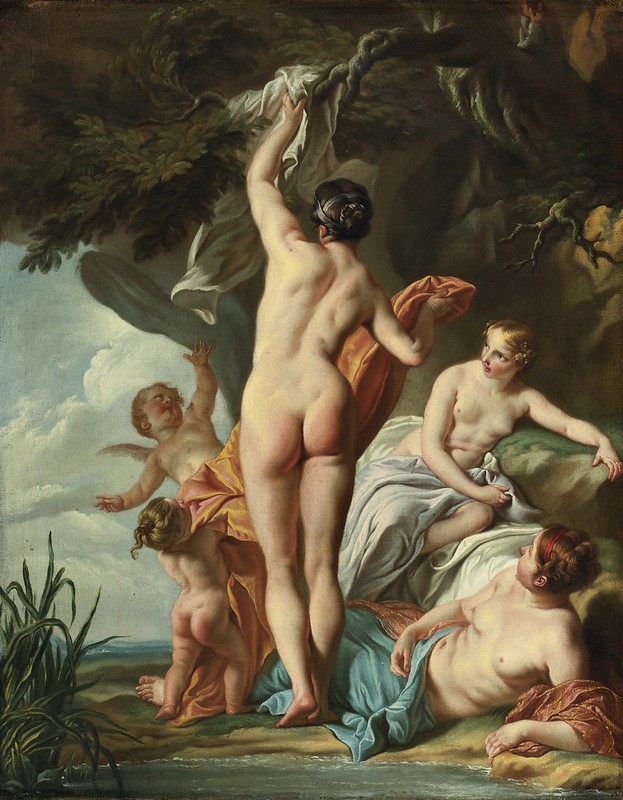Obra de Noël-Nicolas Coypel (1690-1734), pintor francès (1)
- Recordatori de Jean-Baptiste Loeillet of London -
En el dia de la celebració del seu 335è aniversari de naixement
Parlem de Pintura...
Noël-Nicolas Coypel (París, 17 de novembre de 1690 - París, 14 de desembre de 1734) va ser un pintor francès. Fill de Noël Coypel, amb qui es va formar, i membre d'una destacada família de pintors, formada per Antoine Coypel i Charles-Antoine Coypel, va entrar a la Reial Acadèmia de Pintura i Escultura el 1720. Si bé el seu caràcter introvertit va limitar el seu ressò públic, va ser un pintor de bona tècnica. Es va especialitzar en pintura mitològica destacant obres com La Violació d'Europa el 1727 (Museum of Art, Philadelphia). Va morir a París el desembre de 1734.
Font: En català: No disponible - En castellano: No disponible - In english: Noël-Nicolas Coypel (1690-1734) - Altres: Noël-Nicolas Coypel (1690-1734)
Parlem de Música...
Jean-Baptiste Loeillet (Gent, 18 de novembre de 1680 - London, 19 de juny de 1728) va ser un clavecinista, flautista i compositor flamenc. El 1705, després d'haver estudiat a Gant i a París, es va traslladar a Londres on va ser conegut amb el nom de Jean-Baptiste Loeillet of London per no confondre'l amb el seu cosí compositor Jean Baptiste Loeillet of Ghent. Allà es va fer conegut per la seva labor com a docent però també com a compositor. Va ser director de concerts i va publicar nombroses obres per a flauta i una col·lecció de lliçons per a clavecí. Va morir a Londres el juny de 1728.
Font: En català: Jean-Baptiste Loeillet of London (1680-1730) - En castellano: Jean-Baptiste Loeillet of London (1680-1730) - In english: Jean-Baptiste Loeillet of London (1680-1730) - Altres: Jean-Baptiste Loeillet of London (1680-1730)
Parlem en veu pròpia o en veu d'altri...
Loeillet composed two sets of "Lessons" for the harpsichord or spinet, Six Sonatas for a Variety of Instruments, Op. 1, Twelve Solos (sonatas) for flute with basso continuo, Op. 3, and Twelve Sonatas in Three Parts, Op. 2 which were published in 1725. Early in the twentieth century, the sixth of these sonatas, originally written in c minor for flute, oboe or violin, and basso continuo (harpsichord and cello), was adapted for modern piano trio by Alexandre Béon. "The only constant is change." A cliché, of course, but none the less true and particularly true concerning the performance of music from the seventeenth and eighteenth centuries. What we now consider to be respectfully authentic the nineteenth and early twentieth century would have found unpalatably dry and what they regarded as expressive our time sees as unstylistic and self-indulgent. A redefinition can alter our evaluations, however. Instead of thinking of Bach-Stokowski as out-of-style and excessive, why not regard it as something completely new?—a collaboration across time bringing Stokowski's inspired orchestration to Bach's eighteenth century compositional genius. Just so is Alexandre Béon's 1911 harmonization and adaptation of Loeillet's 1725 sonata. With the violin taking the flute part and the cello replacing the oboe, here is an old jewel, recut, polished and placed in a new setting where it shines with even greater brilliance.
JEFFREYSOLOW (source/font: aquí)
Gaudiu i compartiu!
Informació addicional...


Un administrador del blog ha eliminat aquest comentari.
ResponEliminaGracias, siempre pones cosas interesantes, y a mí las triosonatas barrocas
ResponEliminame encantan, vengan de donde vengan...
Saludos, Daniel, desde Madrid.
Thank you for this nice sounding share. Always appreciate your kind efforts and choices. Entertaining and instructional. Gracias.
ResponElimina¿Podrías, por favor, volver a publicar esta obra? Ayer escuché una sonata de este autor en Radio Clásica y me encantó.
ResponEliminaUn administrador del blog ha eliminat aquest comentari.
ResponElimina